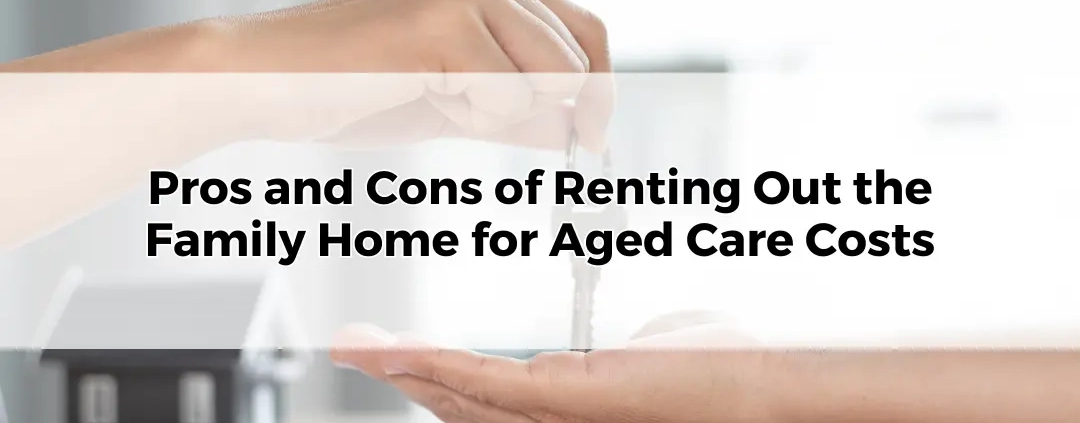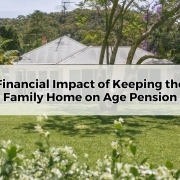Pros and Cons of Renting Out the Family Home for Aged Care Costs
Table of Contents
ToggleAs people age, the need for aged care often becomes inevitable. This necessity brings about significant financial challenges. One common strategy to meet these costs is renting out the family home. While this can provide a steady income, it also comes with a host of considerations. Understanding the full scope of renting out your home is essential for making an informed decision.
Renting out the family home can be an effective way to generate income to cover aged care expenses. This strategy allows you to maintain ownership of your property while utilising it as a financial resource. However, this approach requires careful planning and consideration of various factors.
Financial Benefits
Steady Income Stream
Renting out your family home provides a steady stream of income, which can be used to cover aged care costs. This regular income can offer financial stability and reduce the need to liquidate other assets.
Tax Advantages
There can be tax benefits associated with renting out your property. Rental income is taxable, but you can deduct certain expenses, such as maintenance, property management fees, and depreciation, which can reduce your overall tax liability.
Preserving Home Ownership
By renting out the family home, you can preserve ownership of the property. This means that you can retain the asset’s value and potentially benefit from future capital appreciation. Additionally, the home remains available for future use by family members.
Financial Drawbacks
Rental Income Taxation
While rental income provides financial benefits, it is also subject to taxation. The rental income you receive must be declared on your tax return, which can increase your taxable income and potentially move you into a higher tax bracket.
Maintenance and Management Costs
Maintaining a rental property involves ongoing costs, such as repairs, property management fees, and regular upkeep. These expenses can add up and reduce the net income you receive from renting out the property.
Market Fluctuations
The rental market is subject to fluctuations, which can impact your rental income. Economic downturns, changes in local property markets, and other factors can affect rental demand and pricing, potentially reducing your income.
Emotional and Psychological Impact
Attachment to the Family Home
The family home often holds significant emotional value. Renting it out can be emotionally challenging, especially if it has been in the family for a long time. The idea of strangers living in a cherished home can be difficult to accept.
Adjusting to Change
Transitioning to aged care and renting out the family home involves major life changes. Adjusting to these changes can be stressful and emotionally taxing for both the homeowner and their family.
Impact on Family Dynamics
Renting out the family home can impact family dynamics, particularly if multiple family members have an emotional attachment to the property. It’s important to have open discussions with family members to address any concerns and ensure everyone is on the same page.
Legal and Regulatory Considerations
Tenancy Laws
Understanding tenancy laws is crucial when renting out your property. These laws govern the rights and responsibilities of both landlords and tenants, and non-compliance can result in legal issues and financial penalties.
Rental Agreements
Drafting a comprehensive rental agreement is essential to protect your interests. The agreement should outline the terms of the tenancy, rent payment schedule, maintenance responsibilities, and other important details.
Insurance Requirements
Renting out your home requires appropriate insurance coverage. Standard homeowner’s insurance may not cover rental activities, so you will need to obtain landlord insurance to protect against potential risks, such as property damage and liability claims.
Impact on Government Benefits
Pension Implications
Rental income can affect your eligibility for government benefits, such as the Age Pension. It’s important to understand how rental income will be assessed under the means test to avoid any unexpected reductions in benefits.
Means Testing for Aged Care
Means testing for aged care takes into account your income and assets. Rental income and the value of the rented property can impact your means-tested care fee, potentially increasing your out-of-pocket costs for aged care services.
Practical Considerations
Finding Reliable Tenants
Finding reliable tenants is crucial to ensure a steady rental income and minimise property damage. Conduct thorough background checks and reference checks to select tenants who will respect your property and pay rent on time.
Property Management Options
Deciding whether to manage the property yourself or hire a property manager is an important consideration. While managing the property yourself can save money, a property manager can handle day-to-day responsibilities and reduce your stress.
Preparing the Home for Rent
Preparing your home for rent involves making any necessary repairs, cleaning, and possibly upgrading certain features to make the property more attractive to potential tenants. This preparation can help you secure higher rental rates and better tenants.
Alternatives to Renting
Selling the Family Home
Selling the family home is another option to consider. This can provide a large sum of money to cover aged care costs and eliminate the responsibilities associated with being a landlord. However, it also means giving up ownership of the property.
Equity Release Schemes
Equity release schemes, such as reverse mortgages, allow you to access the equity in your home without selling it. These schemes can provide funds for aged care costs while allowing you to remain in your home or retain ownership.
Moving in with Family Members
Moving in with family members can be a practical solution to reduce living expenses and ensure you receive the care you need. This arrangement requires careful planning and clear communication to ensure it meets everyone’s needs.
Expert Advice
Consulting Financial Advisers
Consulting with a financial adviser can help you understand the financial implications of renting out your home. An adviser can provide personalised advice based on your financial situation and goals.
Legal Counsel
Seeking legal counsel is important to ensure you comply with tenancy laws and properly draft rental agreements. A lawyer can help you navigate legal complexities and protect your interests.
Property Managers
A property manager can take on the responsibilities of managing your rental property, including finding tenants, handling maintenance issues, and collecting rent. This can provide peace of mind and reduce the burden on you and your family.
Long-term Implications
Estate Planning
Renting out your home has long-term implications for your estate planning. It’s important to consider how this decision will affect your estate and inheritance plans and to update your will and other legal documents accordingly.
Inheritance Considerations
Discussing the future of the family home with your heirs is important. Renting out the property can impact their inheritance, and it’s essential to ensure they are aware of and agree with your plans.
Future Housing Needs
Consider your future housing needs when deciding to rent out your home. Ensure that the arrangement aligns with your long-term plans and provides the flexibility to adapt to changing circumstances.
Conclusion
Weighing the Pros and Cons
Renting out the family home to cover aged care costs has both benefits and drawbacks. It’s important to weigh these factors carefully and consider how they align with your financial goals, emotional well-being, and long-term plans.
Making an Informed Decision
Making an informed decision requires thorough research, careful planning, and consultation with professionals. By understanding all aspects of renting out your home, you can make a choice that best meets your needs and provides financial security for your future.









